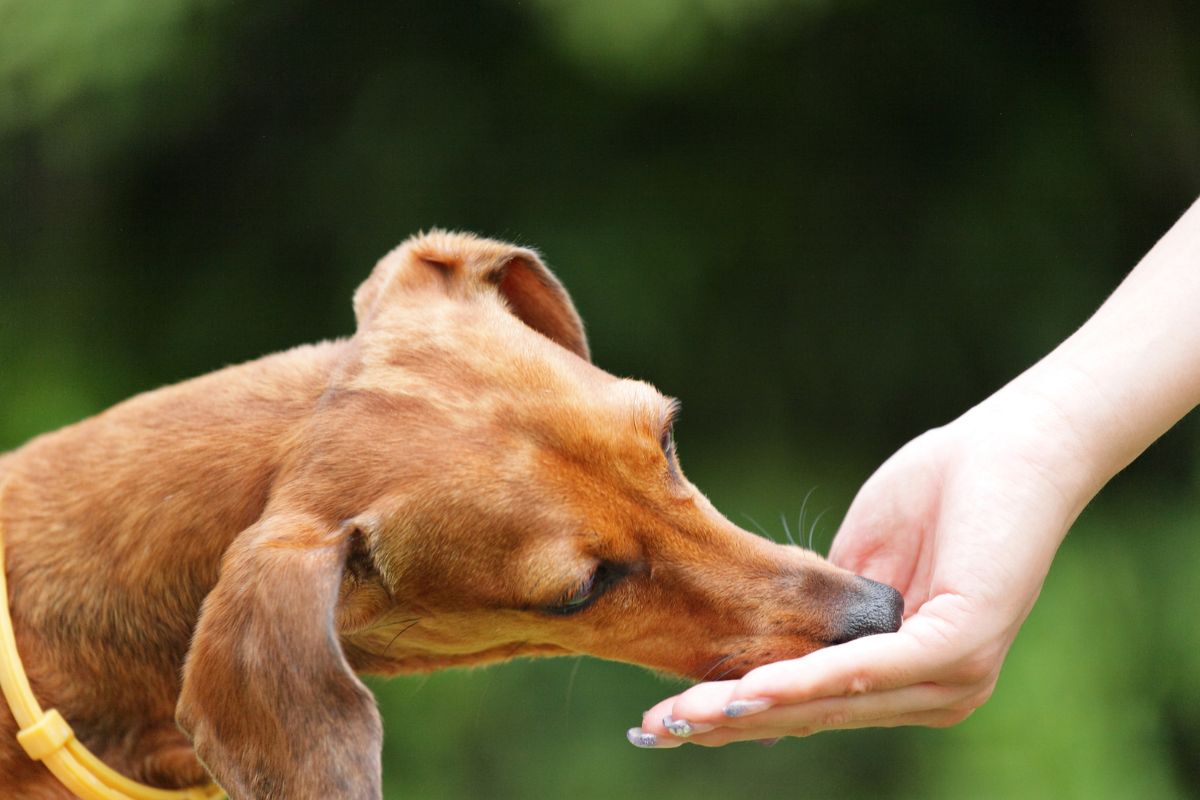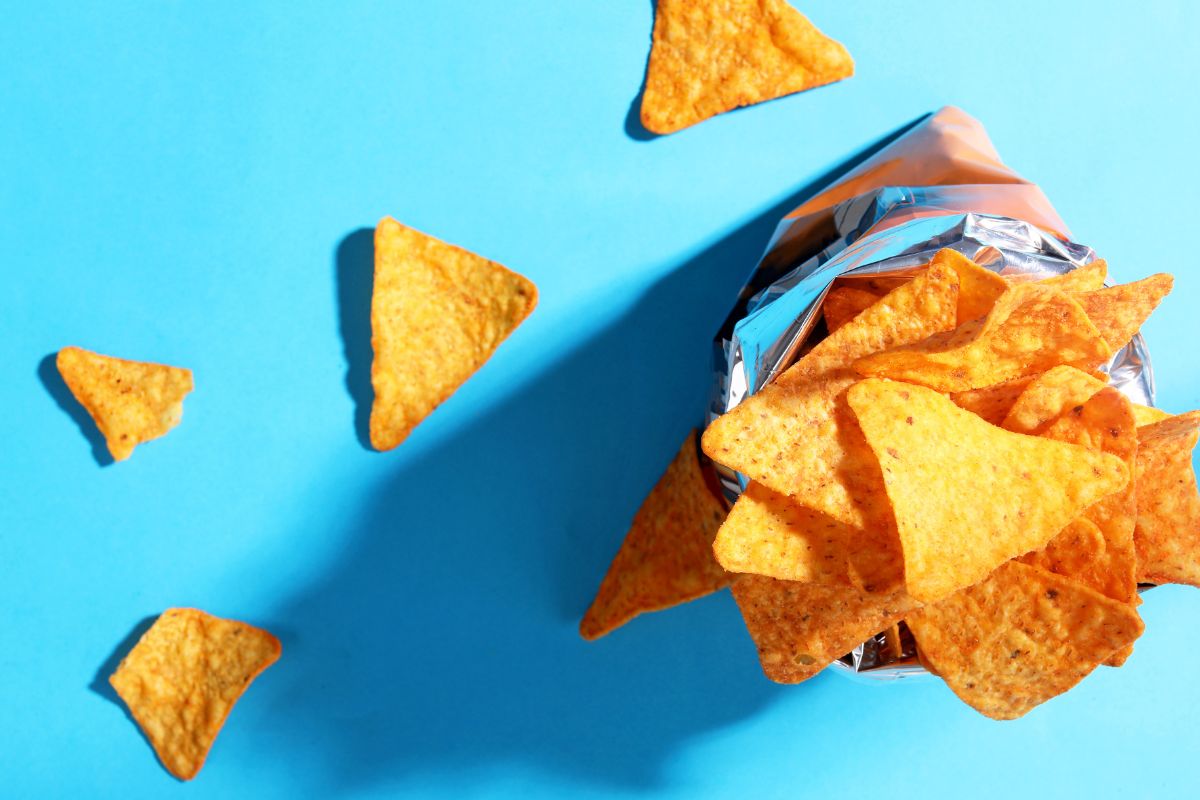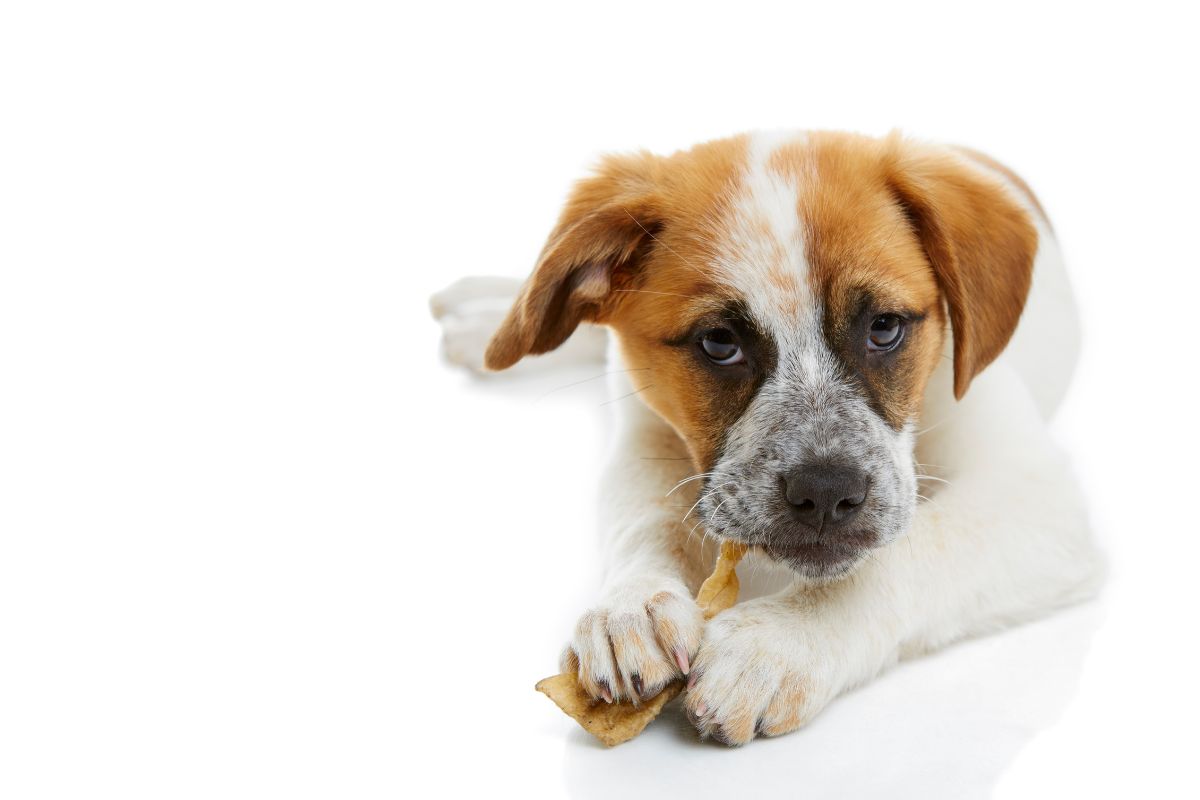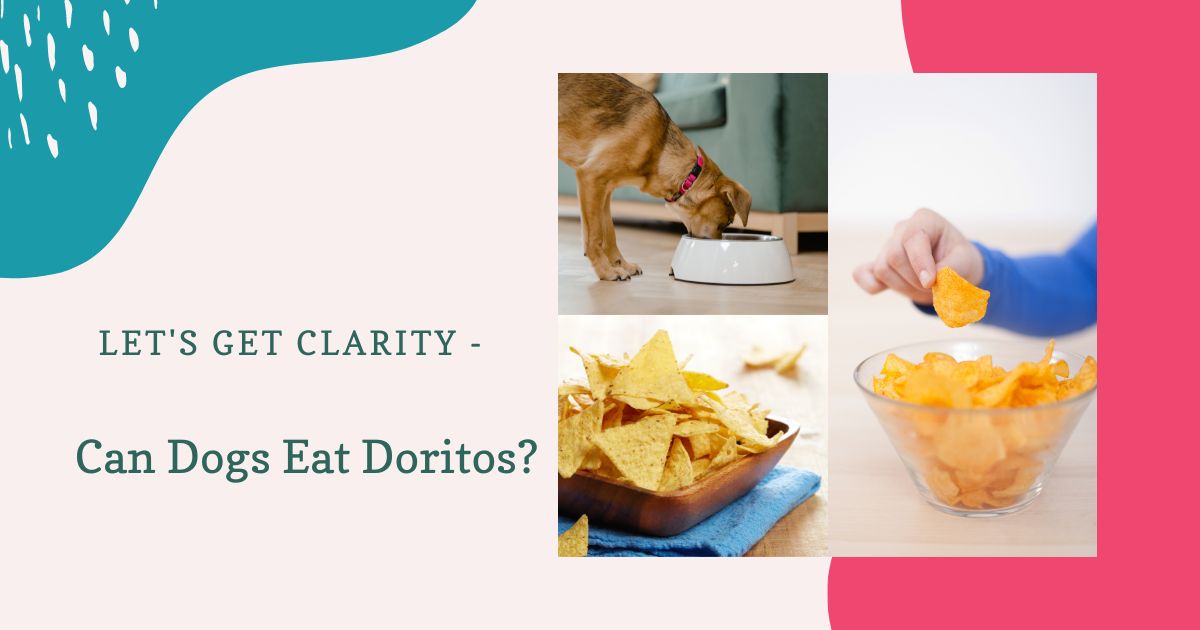Dogs and Chips
Can dogs eat Doritos? While you might be wondering, as many people are, about the ingredients and other information in a Dorito chip, you might also feel scared.
Many Dorito chips contain many ingredients, like garlic and onions, which can be hazardous to dogs. There is good news, though! The components in a Dorito are not poisonous enough to truly kill your dog.

Are Potato Chips Bad for Dogs?
Your Doritos have fat and salt and are rich in empty calories. If your dog habitually consumes these foods, it may lead to health issues. Over time, they may experience pancreatic problems, diabetes, heart disease, obesity, and other conditions.
Additionally, eating too many Doritos might make your dog ill and cause diarrhea and vomiting. They include a lot of preservatives and spices that can upset your dog’s stomach and produce flatulence. Additionally, even though your dog may have no problem eating maize in many dog foods, Doritos are exclusively made of corn and corn flour, which is bad for your pet.
Can Dogs Eat Potato Chips?
Are chips safe for dogs to eat? Can puppies eat potato chips? You might be enjoying a bag of potato chips and wondering if you can share it with your dog. Are potato chips okay for dogs to consume? The quick response is no. Depending on the quantity consumed, dogs may be able to eat potato chips safely, but it’s still not good for them.
After a few chips, they could be alright, but these treats have little nutritional value and are full of processed substances that can cause health problems in dogs. Consult your veterinarian before giving your dog any human food, even potato chips.
Can Dogs Eat Corn Chips?
You may ask yourself, can dogs eat banana chips? Can they eat corn chips? The quick response is: It is not advisable. Although a few corm chips won’t hurt your dog immediately, eating a lot of them at once or over the long run could harm its health.
Why Corn Chips are Not Ideal for Dogs
Although you might want to let your dog enjoy this delicious snack, there are several characteristics of corn chips that are not very healthy.
Sodium
The high salt content of corn chips, particularly the flavored ones, can harm your dog’s health. Most of the time, your dog can tolerate the sodium in its food or treats, but too much salt can negatively affect its health, raising its blood pressure and increasing its risk of heart disease.
A healthy dog weighing 33 pounds (15 kilograms) shouldn’t take more than 0.004 oz (100 mg) of salt daily, according to the U.S. National Academy of Sciences and National Research Council Board on Agriculture and Natural Resources.
However, 1 ounce (28.3 grams) of corn chips has about 0.006 oz (170 mg) of salt (this may vary with the brand). Therefore, if your dog consumes a bag of corn chips, it will likely experience severe health issues, such as sodium poisoning.
There are symptoms of vomiting, excessive thirst or urination, lethargy, and decreased appetite in dogs who have sodium poisoning. Seizures, tremors, a coma, and even death could result from it in extreme circumstances.
Calories
Additionally, eating corn chips exposes your dog to too many calories. According to the USDA, 1 ounce (28.3 grams) of corn chips has roughly ten calories. Most dogs require between 25 and 30 calories to maintain a healthy weight.
Giving it a lot of corn chips will leave it with many calories, even though the number of calories in corn chips varies depending on the brand you choose, especially if it is not athletic or active.
Fats
Although corn is safe and nutritious for dogs, especially if given in moderation, the chips we frequently fry in oils can occasionally have harmful fats and calories. For example, the fats may contain significant amounts of saturated and trans fats, linked to higher risks of cardiovascular disease in canines.
Trans fats are detrimental to your dog’s health since they raise the bad cholesterol, decrease good cholesterol, and may even promote inflammation, claims Harvard Health Publication.
Can Doritos Kill Dogs?
You may wonder, can dogs eat Doritos nacho cheese? Can Doritos kill dogs? Even though Doritos are junk food, they don’t contain any substances that could be fatal to your dog. Doritos are only some of the best dog treats, so avoid making it a routine to give them to your dog every day.
Even if your dog is giving you those adorable puppy eyes, keep Doritos away if they have health issues like high blood pressure because the cheese flavoring in chips is quite salty.
Can Dogs Eat Chips Without Salt?
Because you don’t have to worry about the consequences of your dog consuming too much salt, such as dehydration, elevated blood pressure, or sodium poisoning, salt-free chips may be slightly safer. Unsalted chips still have all the fat and oils bad for your dog.
How to Feed Doritos Safely to a Canine
Although your dog won’t perish as a result of eating Doritos, you should choose healthier treats that will provide your dog with some nourishment. If your dog loves Nacho Cheese like crazy, consider exploring these options.
You can decide to produce dog treats that are an excellent substitute for “chips” or buy dog treats designed for dogs. You can also offer your dog a chew toy or dental stick, which is a much better option, or you can choose savory treats manufactured specifically for dogs and prepared with meat.
Giving your dog flavored rawhide chips is another option, even though corn chips won’t harm them. Many chips are available online or in pet food stores that can benefit them in various ways, give them a fair amount of protein and other nutrients, and help their oral cleanliness.

Why do People Feed Doritos to Their Dogs?
Many people treat their dogs to Doritos as a reward. But Doritos include a lot of salt and fat. Additionally, the Cool Ranch and Nacho Cheese varieties include hazardous garlic and onion powders for dogs. They also contain lactose, which, if your dog has any dairy sensitivity, may irritate their stomach.
A dog that consumes too much salt may experience seizures, depression, tremors, elevated body temperature, and vomiting to death. Other food flavors, such as Doritos, could make you think twice before sharing. Garlic and onions in any form might make your dog anemic.
Why do Canines Like Doritos?
Because they are salty and crunchy, dogs enjoy Doritos. Dogs don’t view the act of licking their chops after consuming Doritos as humans do. Dogs view Doritos as a nice treat; thus, they will cheerfully eat them even if it makes their human uncomfortable to witness it.
Possible Health Risks Associated With Dogs and Doritos
Can my dog’s consumption of Doritos cause health problems? Since each dog is different, there is no conclusive response to this query. While some dogs might be able to consume Doritos without any concerns, others might have digestive problems. It is best to steer clear of providing Doritos to your dog if you worry they may cause a reaction.
First off, dogs shouldn’t eat Doritos as a snack. They are unhealthy for dogs since they are heavy in sodium and fat. Second, a dog’s stomach may become irritated by the spices in Doritos. To avoid dehydration if your dog eats Doritos, ensure to provide it with lots of water.
In addition to having a lot of empty calories, they also have a lot of salt and fat. In actuality, they may contribute to your dog’s development of diabetes, heart disease, or even pancreatic illness. Make your pet a healthy treat by creating it yourself.
The History of Dogs and Doritos
From wolves, dogs descended. They pursued prey. Their staple food was beef. As domestic animals, dogs evolved to be omnivores, consuming meat and plant material.
The sense of taste is essential for survival. Animals fail to ingest poisonous or sickening things due to their sense of taste. Dogs have unique taste buds that react to meats, fats, and sweets. Dogs’ taste buds dislike the salt flavor, whereas humans enjoy it. Humans may enjoy spicy meals, but dogs will steer clear of them.
Humans understand that some cuisines relate to particular cultures and family histories. A dog’s culture and group when they were puppies may have some bearing on their food preferences.
The smell of food on their littermates and the other animals in their packs might irritate puppies.
As a result, there is a good chance that your dog smells your breath and is drawn to foods with that smell because you and your dog have a tight living relationship.
Your dog might be responding to an association with the smell of your Dorito breath if it begs you to taste your Doritos. Doritos are probably not the ideal food for your dog to eat as a snack in your home, though, as they were not on the menu in the wild.
Can Dogs Taste Doritos?
Dogs lack the human ability to taste things carefully. Dogs only have roughly 1700 taste buds compared to humans’ about 9000. The palate, the back of the mouth, and the papillae on top of the tongue all contain taste receptors.
Dogs can taste the four main flavors—salty, sweet, sour, and bitter—just like humans. They possess unique taste buds at the tongue’s tip that allow them to distinguish the flavor of the water—their exceptional water sensitivity results from their ability to survive in the environment.
People get an attraction to salt and love eating items with salt, such as Doritos. According to studies on their taste preferences, dogs do not share their liking for salt. This is a result of dogs deriving from mostly meat-eating carnivores. The high salt content of meat is a natural occurrence, and the dogs never acquired a “taste” for salt.
On the other hand, dogs have unique receptors for fruits and tomatoes when it comes to sweets. Their tongues react to a substance called furaneol found in fruits. Dogs might not have as much of a “sweet tooth” as they have a “sweet tongue”! To prevent dehydration when hunting, they have a greater demand for water than food.
Dogs dislike bitter flavors, and if given a chance, they will steer clear of them. Doritos are not harmful, and your dog can taste them. However, there are several health factors that you should take into account when sharing treats with your dog.
For instance, we recently learned that dogs don’t like the taste of salt. A dog that consumes too much salt may experience seizures, depression, tremors, elevated body temperature, and vomiting to death.
Other food flavors, such as Doritos, could make you think twice before sharing. A taste might be acceptable. However, consuming a lot of onions or garlic can make your dog weak, throw up, or have respiratory issues.
Signs Your Dog is Trying to Take Your Doritos
Are your dog’s eyes beseeching? You recognize the look. Its large, endearing eyes are on you. Who could refuse to give in and share their delectables?
They can also communicate with you differently to let you know they desire to eat human food. When you are cooking or dining, your dog could come to the area where you are. If it has proper training, it might wait calmly while you offer it something.
But that food bowl will receive a big snub if it doesn’t like what you’ve put in front of it. Some dogs seem to eat anything, while others seem to be extremely picky eaters; both types of dogs seem to convey messages about what they want (or don’t want) by how enthusiastically they seek out or reject the food.
Your dog will let you know when it wants you to share your treats. You’ll be able to tell by its begging habits. Your dog gets fixated on its prey and desired object while staring at your meal due to its innate hunting drive.
It might also be speaking to you by tilting its head or casting you one of those watchful looks that indicate it is waiting for you to contribute. If your dog becomes impatient, it can start barking to gain your attention, so you’ll give it the treat.
However, some dogs are picky eaters and may only take a whiff of the food before leaving. This could hint that the food is bad, the dog doesn’t like the flavor, or the dog has a medical issue. Your dog may also express its interest in your snack in other ways. It might simply purchase it for itself!
Have you ever seen your dog dig into a bag of chips or help itself to your bowl of treats? Who needs permission when helping oneself? Some dogs have mastered jumping up and retrieving objects off tables and counters.
Dogs dislike spicy food. Your dog would steer clear of anything spicy or rotten if you gave it to it. It will try to escape the unpleasant item by backing away and shaking its head.
You will notice systemic reactions in your dog if it consumes excessive amounts of salt or garlic, which are symptoms of a severe illness. These effects may include nausea, diarrhea, fatigue, difficulty breathing, or depression.

Canine Snack Manner Training Tips
Teach your dog appropriate behavior for the dinner table and around dining members of the family. Veterinarians advise feeding just dog food to your pet. Snacks and table food contain elements that are bad for dogs and can lead to obesity.
Your dog needs to learn to “leave It” when it comes to your human food and to eat its food. Make sure your dog only eats from its bowl. Teach your dog to go to its position at the table when your family is eating. It will take patience to regularly walk your dog to its location and praise it for remaining there.
Nobody enjoys eating as a dog jumps up at the table or nabs food from your hands. Give your dog no tidbits of your meals. If you start acting that way, you will have recurring problems with begging and food grabbing.
Avoiding developing a harmful habit in the first place is the greatest method. You may enjoy your meals while knowing that your dog has the necessary nutrients to keep healthy if you use good manners and make wise food decisions.
The Bottom Line
In the end, it won’t harm to give your dog some Doritos periodically. Your dog’s health will be in danger if you make it a habit. You should provide something simpler to digest and one that benefits its general health. You should give them to your dog a few times a week or allow it to have the entire bag to itself.
If you give them in large amounts, you might have a lot of issues down the road. Of course, your dogs could choke on these goodies, so it’s generally better to give them something they can chew on more thoroughly rather than swallow whole. Read our article and find out Can Dogs Eat Gummy Bears?

